
Latest News Regarding
Horn of Africa
France supports Ethiopia’s quest for sea access through discussion
France supports Ethiopia’s quest for sea access through discussion

Source: VOA, Sunday December 22, 2024
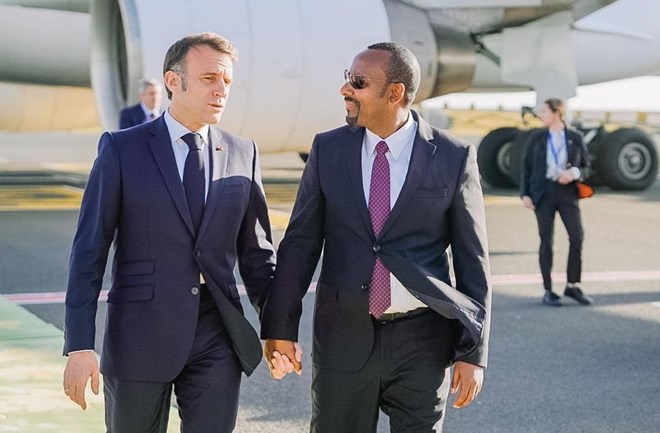
ADDIS ABABA, ETHIOPIA — French President Emmanuel Macron said his country supports Ethiopia’s quest for access to the sea through discussion and respecting international laws and neighboring countries.
Macron spoke on Saturday after a one-day visit to Addis Ababa, where he held bilateral talks with Ethiopian Prime Minister Abiy Ahmed.
During a news conference, Macron welcomed the Ankara Declaration reached by the Federal Democratic Republic of Ethiopia and the Federal Republic of Somalia on Dec. 11.
In the declaration, brokered by Turkish President Recep Tayyip Erdogan, “the leaders of Somalia and Ethiopia reaffirmed their respect and commitment to one another’s sovereignty, unity, independence and territorial integrity, as well as the principles enshrined in international law, the Charter of the United Nations and the Constitutive Act of the African Union.”
The two sides also agreed to start “technical negotiations” by February on details of Ethiopia’s sea access, and that those negotiations would be facilitated by Turkey and be “concluded and signed” within four months.
The breakthrough came after an almost yearlong dispute between Somalia and Ethiopia that began Jan. 1 when Somaliland’s former president, Muse Bihi Abdi, and Ethiopia’s Abiy signed a memorandum of understanding to lease 20 kilometers of Somaliland seafront to Ethiopia for 50 years, in return for diplomatic recognition.
The Somali government rejected the deal and accused Ethiopia of a “blatant violation” of its sovereignty and territorial integrity.
On Saturday, President Macron expressed his readiness to support Ethiopia’s legitimate quest for sea access.
He said France is interested in playing its part in facilitating ways in which sea access can be achieved responsibly through talks, in a way that recognizes international laws and respects neighboring countries.
Abiy said the two leaders have thoroughly discussed his country’s pursuit of peaceful access to the Red Sea. He said the French president accepted Ethiopia’s request for support in its quest for sea access through international law, peacefully and diplomatically.
“The ties between our two nations continue to be strengthened and I look forward to our discussions during his stay in Ethiopia,” Abiy said of Macron in a post on X.
Macron also touched on a domestic issue in Ethiopia: the implementation of the Pretoria agreement signed in November 2022 by Ethiopia’s federal government and the Tigray People’s Liberation Front that ended a deadly two-year war.
Macron said France is keen to support those affected by the conflict and would like to see the rule of law upheld through the transitional justice process.
Abiy and Macron also toured Ethiopia’s newly renovated National Palace in Addis Ababa, the former home of emperor Haile Selassie that was restored with the help of 25 million euros provided by the French Development Agency. The Ethiopian government plans to open it to the public as a museum.
French architects and other professionals have also participated in the renovation process, Macron said.
According to Macron, France is also providing funding and technical support for ongoing renovation at the Rock-Hewn Churches at Lalibela in the Amhara region. The site was added to UNESCO’s World Heritage list in 1978.
It’s the second time Macron has visited Ethiopia in six years.
Before traveling to Ethiopia, Macron visited the cyclone-hit Indian Ocean island of Mayotte, where residents demanded more support in light of the cyclone that devastated the island and claimed dozens of lives.
Macron also stopped by Djibouti, which hosts the largest French military base in the continent, where he dined with his troops.
After meeting with President Ismail Omar Guelleh, Macron described relations with Djibouti as a solid, deep-rooted and forward-looking partnership.
Russia forgives Somalia’s Soviet-era debt
Russia forgives Somalia’s Soviet-era debt

Source: TASS, Saturday December 21, 2024
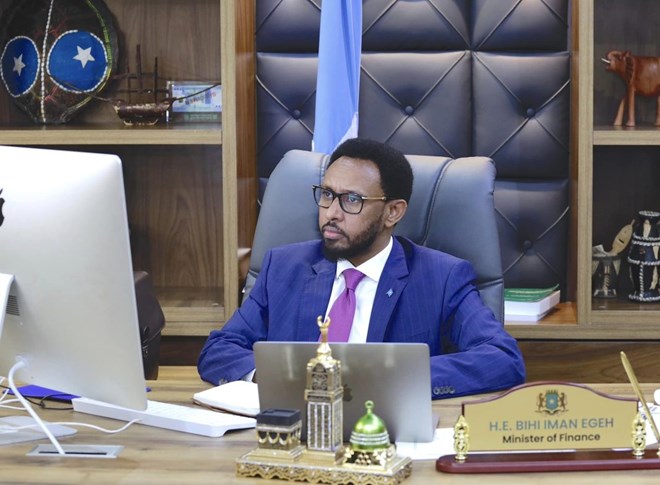
The governments of Russia and Somalia have agreed to settle the African nation’s debt to Moscow.
The document dated December 10 was posted on the web portal of regulatory acts. According to the text of the agreement, the amount with interest accrued under long-term loans extended before October 1, 1984 by the Soviet government to Somalia is written off. The schedule to the agreement indicates that the total debt amount was $48.1 mln.
“One hundred percent of the stated amount is consolidated in accordance with this agreement,” the document reads. “The government of the Federal Republic of Somalia is released from paying the full consolidated amount,” the agreement stipulates.
The document is a follow-up to the Russian-Somalian agreement dated July 26, 2023 that set forth the debt repayment schedule. With Somalia now exempt from paying back Soviet-era loans, the schedule has been adjusted, and the remaining debt will be fully settled by April 2028.
Uganda, Kenya, South Sudan agree on plans to mark shared borders
Uganda, Kenya, South Sudan agree on plans to mark shared borders
Source: The Kampala Post
by Nicholas Agaba
Saturday December 21, 2024
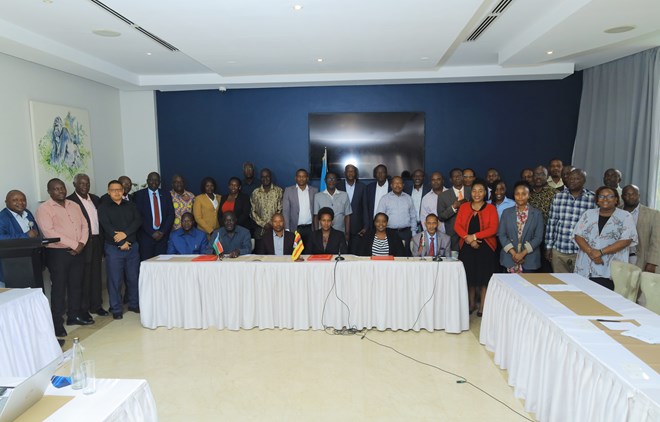
The 4th Tripartite Technical Boundary Committee (TTBC) meeting, involving Uganda, Kenya, and South Sudan, was held from December 17 – 19 at the Golden Tulip Hotel, Kampala. The meeting aimed to track progress on decisions made in earlier sessions in December 2019, September 2021, and December 2021. Key objectives included revising work plans and budgets for establishing the tri-junction and agreeing on a start date for reaffirming the boundary point.
Jacqueline W. Banana, Acting Head of the Department of Regional Peace and Security, led Uganda’s delegation. Kenya’s delegation was led by Juster Nkoroi, Head of the Kenya International Boundaries Office (KIBO), while South Sudan’s delegation was headed by Dr. David Nailo Mayo, Chairperson of South Sudan’s Transboundary Committee.
The meeting was officially opened by Uganda’s Permanent Secretary of the Ministry of Foreign Affairs, Bagiire Vincent Waiswa, who emphasised the importance of reaffirming and demarcating the tri-junction boundary. He highlighted the significance of resolving boundary disputes to promote regional stability, cooperation, and development. “The three nations are bound together not only by geography but by shared heritage, language, customs, and norms, including mutual interests in trade, security, and development,” Bagiire said.
Bagiire also acknowledged the support of the African Union Border Programme (AUBP), the German Corporation for International Cooperation (GIZ), and the East African Community (EAC). These partners have provided funds, equipment, and technical expertise while conducting sensitisation efforts to involve border communities in the demarcation process.
Banana, leading Uganda’s delegation, welcomed all participants and expressed gratitude to the African Union for funding the previous tripartite meetings. She reiterated that the sessions had laid the groundwork by agreeing on modalities, budgets, and work plans for establishing the tri-junction.
Juster Nkoroi, Kenya’s Head of Delegation, noted that significant milestones had been achieved, including seven sensitisation exercises and high-level meetings, such as the Ateker leaders’ forum in Moroto in November 2024 and a peace caravan in July 2023. She reaffirmed Kenya’s readiness to implement agreements on boundary reaffirmation, delimitation, and demarcation in line with the African Union’s 2027 deadline.
Dr. David Nailo Mayo, head of South Sudan’s delegation, acknowledged the longstanding support of the African Union Border Programme since its inception in 2007. He lauded the AU’s efforts in facilitating meetings and aiding in border-related initiatives.
The meeting concluded with the signing of the report on the Kenya-South Sudan-Uganda Tripartite Technical Boundary Committee’s progress, marking another step towards establishing the tri-junction boundary poin
Somaliland proposes hosting US military base in exchange for independence recognition
Somaliland proposes hosting US military base in exchange for independence recognition
Source: Caliber.Az
Saturday December 21, 2024
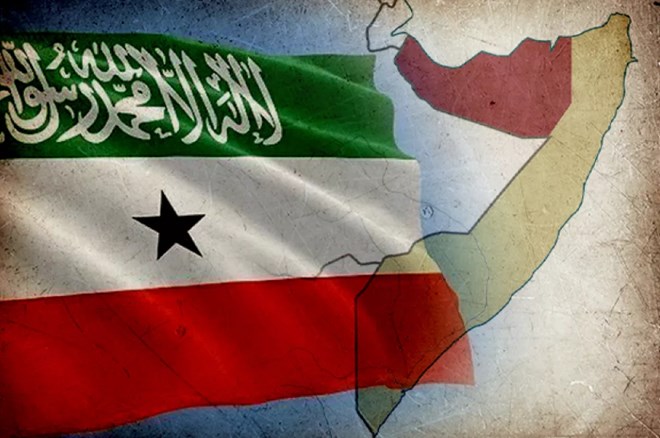
The self-declared Republic of Somaliland has announced its readiness to host a US military base in the strategic port city of Berbera, provided such an arrangement aligns with the mutual interests of both nations.
“Somaliland would be ready to host a US military base in Berbera if it serves the mutual interests of our two nations,” Bashir Goth, Somaliland’s representative to the United States said, Caliber.Az reports via Russian media.
He emphasized that this potential cooperation is not contingent on US recognition of Somaliland’s sovereignty, though he expressed hope that such recognition might come under President Donald Trump’s administration.
“We consider ourselves an independent and sovereign state. Therefore, we evaluate any partnerships with friendly nations exclusively through the prism of our national interests,” Goth stated, addressing concerns about potential ramifications for Somaliland’s strained relationship with Somalia.
Recent reports from the publication Semafor suggest that a Trump presidency could significantly accelerate US recognition of Somaliland as an independent state. Such a move could enhance US intelligence operations in the volatile region, including monitoring arms transfers, observing Chinese activities from its military base in Djibouti, and tracking Houthi movements in Yemen.
Thomas Wolf, a political analyst with Kenya-based research centre TIFA, indicated that recognizing Somaliland’s sovereignty would provide the US with strategic advantages. “Trump, after assuming office, may declare recognition of Somaliland to leverage Berbera’s port on the Red Sea, including for military purposes,” he noted.
Somaliland, located in the northwest of Somalia along the Red Sea, declared independence unilaterally in 1991 but has not received international recognition. It operates its own currency, military, and issues passports.
In January 2024, Somaliland signed an agreement with Ethiopia granting lease rights to the Berbera port in exchange for Ethiopia’s recognition of Somaliland’s independence. This deal intensified tensions between Ethiopia and Somalia’s federal government, which refuses to acknowledge Somaliland’s sovereign status.
On December 12, Turkish President Recep Tayyip Erdoğan announced a breakthrough in negotiations between Somali President Hassan Sheikh Mohamud and Ethiopian Prime Minister Abiy Ahmed. Talks held in Ankara resulted in a joint declaration, committing the two nations to resolve their disputes through Turkish-mediated technical discussions by February 2025. A bilateral agreement is anticipated within four months of these discussions.
Somalia hires lobbyists, prepares for more combative Trump era
Somalia hires lobbyists, prepares for more combative Trump era

Source: theafricareport, By Julian Pecquet, in Washington
Saturday December 21, 2024
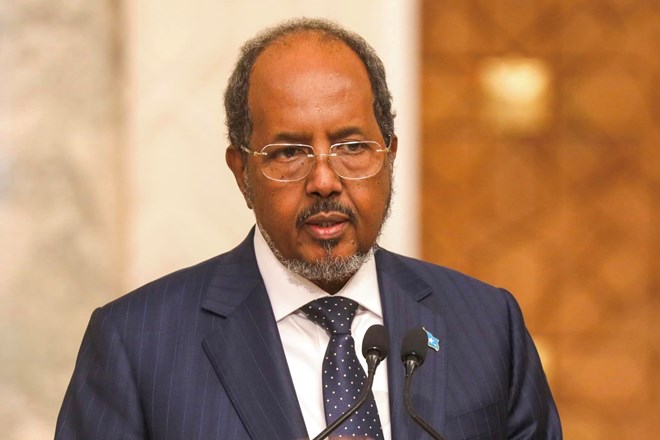
Trump’s entourage is pushing for the US to recognise Somaliland, with Senate committee leadership also favouring the breakaway province.
The Somali embassy has hired one of Washington’s top lobbying firms as it braces for a potentially rocky road ahead under President-elect Donald Trump.Barely two months into his tenure, Ambassador Dahir Abdi hired the BGR Group on 27 November for $50,000 per month for 12 months, or $600,000 total. The contract filed with the US Department of Justice states that BGR will provide “government affairs services” for the embassy.
Top of mind for the Somali government is the growing push for the US to recognise the breakaway region of Somaliland as an independent country, particularly among Republicans. Since last year, Somalia has also pursued eligibility for the African Growth and Opportunity Act (AGOA).
Relations with the US suffered a blow in Trump’s first term.
The then-president included Somalia in his “Muslim ban” on travel from certain countries and later pulled most US forces battling Islamist insurgents out of the country at the tail end of his first term. President Joe Biden reversed the decision in 2021.
“Somalia and the US are natural partners,” the Somali Embassy tells The Africa Report. “We continue [to] work together on counterterrorism and other important security programmes. We also look forward to expanding that work and the economic relationship to our mutual benefit.”
Somaliland fight
This time around, a growing chorus of Republicans in Trump’s orbit is making the case that he should recognise Somaliland’s independence as a hedge against China in the Horn of Africa.
Countering China policies “should include … recognition of Somaliland statehood as a hedge against the US’ deteriorating position in Djibouti,” former Trump State Department director of Policy Planning Kiron Skinner writes in the diplomacy section of Project 2025, a conservative blueprint for a Republican administration led by the Heritage Foundation.
Several Republican veterans of the first Trump administration – including former Assistant Secretary of State for African Affairs Tibor Nagy and former special envoy for the Great Lakes Peter Pham – are also publicly making that case.
Last week, Republican Congressman Scott Perry of Pennsylvania, a member of the House Foreign Affairs Committee, introduced a bill “to recognise Somaliland of the Federal Republic of Somalia as a separate, independent country”. Perry introduced similar legislation two years ago but it went nowhere.
“We want to keep the conversation open and current,” Perry tells The Africa Report about his decision to introduce the bill in the waning days of the current Congress.
Republican Congressman Brian Mast of Florida, the incoming chairman of the House Foreign Affairs Committee in the next Congress, tells The Africa Report that he has yet to speak to Perry about his bill.
“I’m certainly willing to … sit with him, look at it, see what he’s done on it, and speak to the African subcommittee as well,” Mast says.
Senate Somaliland boosters
Meanwhile, in the Senate, Somaliland advocate Jim Risch of Idaho is set to take control of the Senate Foreign Relations Committee next year following the Republican victory in the November election. Risch introduced a Somaliland Partnership Act in 2022 that stops short of recognition but promotes opportunities for collaboration on regional security issues.
Lobbyists registered on the contract include Lester Munson, a former Republican chief of staff on the Senate Foreign Relations Committee, and Scott Eisner, former president of the US Chamber of Commerce’s US-Africa Business Centre.
BGR previously lobbied for the Somali Ministry of Finance in 2018-2019.
EU extends Operation ATALANTA, EUTM and EUCAP Somalia for two more years
EU extends Operation ATALANTA, EUTM and EUCAP Somalia for two more years
Safety 4 Sea
Source: Safety 4 Sea, Tuesday December 17, 2024
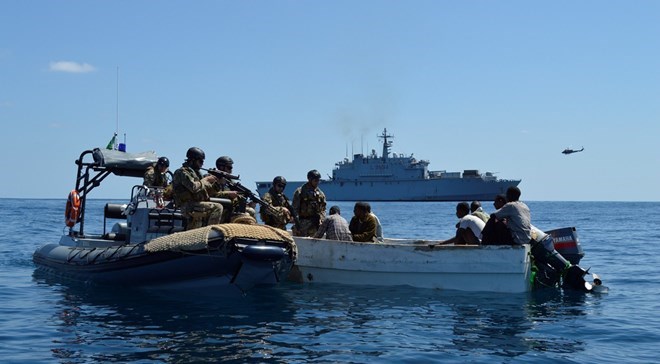
The European Council on 16 December decided to prolong the mandate of the EU Naval Force Operation ATALANTA and of the EU’s military training mission in Somalia (EUTM Somalia) until 28 February 2027.
This comes after the Council’s decision of 5 December to prolong the mandate of the EU’s civilian capacity-building mission (EUCAP Somalia) until the same date. These decisions were taken following the holistic strategic review of the Common Security and Defence Policy (CSDP) engagement in Somalia and the Horn of Africa, with the aim to strengthen the EU’s response to an evolving security context and to enhance its role as a maritime security provider.
At the same time, the Council updated the mandate of Operation ATALANTA to enhance maritime security off the coast of Somalia, in the Gulf of Aden, the West Indian Ocean and parts of the Red Sea, and better support building a wider regional maritime security architecture. With the new mandate, the Operation will continue to fight piracy and reduce illicit trafficking at sea.
Synergies with the maritime Operation ASPIDES, currently protecting merchant shipping in the Red Sea, will be enhanced. In parallel, the Maritime Security Center (MSC) Horn of Africa, supporting both ATALANTA and ASPIDES, is being rebranded as MSC Indian Ocean and its role is being reinforced.
Furthermore, in Somalia, the EU’s CSDP action was widened to support the build-up of Somali Security Forces and institutions with the view to take over responsibility for its own security in the future, in line with the Joint EU-Somalia Roadmap. With the renewed mandates, EUCAP Somalia and EUTM Somalia will support the build-up of capable, sustainable, and accountable Somali security institutions through strategic advice, mentoring and training, accompanied by EU-funded equipment support through the European Peace Facility.
To strengthen the regional approach, the missions and the operation will support capacity-building efforts of the regional and, in particular, Djibouti maritime security forces within their means and capabilities.
According to the Council’s statement, in order to uphold the EU’s core values, all activities will pay particular attention to international humanitarian law, human rights, preventing gender-based violence, protecting children in armed conflicts, and promoting the agenda of women, peace and security and climate, security and defence.
US Special Envoy for Sudan Warns Country Headed for Partition
US Special Envoy for Sudan Warns Country Headed for Partition
Source: The Irish Times published on 13 December 2024 an article titled “Sudan War Pushing Country towards Partition, US Envoy Says” by David Pilling.
According to US envoy to Sudan, Tom Perriello, Sudan is at risk of breaking apart or becoming a “failed state” as foreign powers stoke a war that continues for decades and exacerbates an already massive humanitarian catastrophe.
Egypt reaffirms support for Somalia’s sovereignty, unity, and stability
Egypt reaffirms support for Somalia’s sovereignty, unity, and stability

Source: ahramonline, Monday December 16, 2024
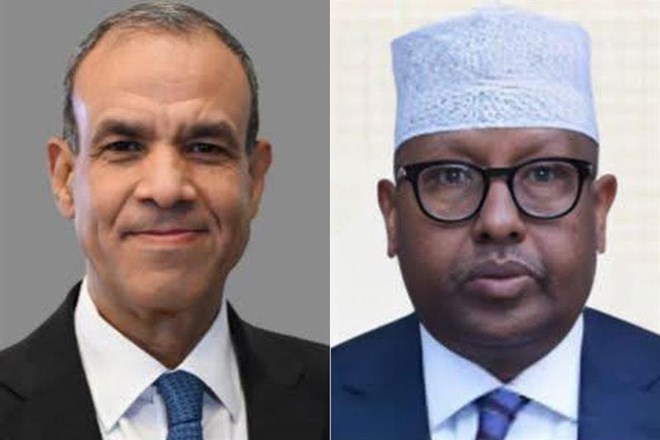
Minister of Foreign Affairs Badr Abdelatty reiterated Egypt’s unwavering support and respect for Somalia’s sovereignty, unity, and territorial integrity during a phone call on Saturday with his Somali counterpart, Ahmed Maalim Fiqi.
According to a statement by the Egyptian foreign ministry, Fiqi briefed Abdelatty on the outcomes of the recent Ankara Trilateral Summit, held between Somalia, Turkey, and Ethiopia on Wednesday.
The statement added that Abdelatty and Fiqi agreed to maintain ongoing coordination and to prepare for the upcoming trilateral ministerial meeting between the foreign ministers of Egypt, Somalia, and Eritrea, a meeting which, according to the statement, reflects the importance the three countries’ leaders attach to holding extensive consultations on issues of mutual concern.
Furthermore, the call between the two diplomats addressed the strategic relations between Egypt and Somalia and the two countries’ desire to strengthen and develop their political, economic, and commercial ties.
According to the statement, Abdelatty and Fiqi also acknowledged that relations between Egypt and Somalia have gained considerable momentum in recent months. They stressed the importance of exploiting that momentum to strengthen ties between the two countries.
In conclusion, the statement highlighted that the two sides confirmed the importance of following up on the outcomes of the trilateral summit that brought together the presidents of Egypt, Somalia, and Eritrea in Asmara in October.
China sends new navy fleet on Gulf of Aden escort mission
China sends new navy fleet on Gulf of Aden escort mission

Source: Xinhua, Monday December 16, 2024
.jpg)
A farewell ceremony is held for a Chinese navy fleet at a port in Zhoushan, East China’s Zhejiang province, Dec 15, 2024. A new fleet of the Chinese People’s Liberation Army Navy set sail from a military port in Zhoushan, East China’s Zhejiang province on Sunday to take over an escort mission from the previous fleet in the Gulf of Aden and the waters off Somalia. (PHOTO / XINHUA)
HANGZHOU – A new fleet of the Chinese People’s Liberation Army Navy set sail from a military port in Zhoushan, East China’s Zhejiang province on Sunday to take over an escort mission from the previous fleet in the Gulf of Aden and the waters off Somalia.
The 47th navy fleet comprises a guided-missile destroyer, a missile frigate and a supply vessel. It carries over 700 officers and soldiers, with two helicopters and more than 10 special force members on board.
Prior to the departure, the fleet conducted trainings focused primarily on the armed rescue of hijacked merchant ships, counter-terrorism and anti-piracy, as well as on the practical use of weapons.
U.S. congressman introduces bill to recognize Somaliland as an independent state
U.S. congressman introduces bill to recognize Somaliland as an independent state

Source: Hiiraan Online, Monday December 16, 2024
Rep. Scott Perry addresses reporters during a news conference at the U.S. Capitol, highlighting ongoing debt limit negotiations in Washington, D.C., on March 10. (Photo: Anna Moneymaker/Getty Images)
Mogadishu (HOL) — A Republican-sponsored resolution seeking U.S. recognition of Somaliland as an independent state has been introduced in the House Foreign Affairs Committee. The proposal, H.R. 10402, submitted by Congressman Scott Perry of Pennsylvania on December 12, has sparked debate but faces steep odds of advancing in Congress.
The resolution advocates for a shift in U.S. policy to acknowledge Somaliland’s self-declared independence. Perry and his Republican allies frame Somaliland as a strategic partner in a region where China and Russia continue to expand their influence. Despite Somaliland’s record of stability since 1991, the resolution’s prospects remain uncertain due to long-standing U.S. support for a unified Somalia.
The Heritage Foundation’s Project 2025, a conservative policy roadmap embraced by Trump-aligned Republicans, explicitly mentions Somaliland. The document proposes U.S. recognition of Somaliland as a strategic move to counter China’s influence in the Horn of Africa. Republican policymakers view Somaliland’s stability and governance as aligning with U.S. strategic interests in Africa.
Trump’s past criticisms of Somalia—he once referred to it as a “failed state”—have further emboldened efforts to elevate Somaliland’s case. Supporters argue that recognizing Somaliland could provide Washington with a reliable partner in an increasingly contested region.
“For over three decades, Somaliland has proven itself as a peaceful, functioning democracy,” said a senior Republican foreign policy advisor. “This resolution is a step toward rewarding that success.”
The Somali government has vehemently opposed the resolution, describing it as a threat to Somalia’s sovereignty and regional stability.
Somalia’s leaders have consistently warned that any move to recognize Somaliland could embolden separatist movements across Africa and jeopardize Somalia’s fragile progress.
Somaliland, located in northern Somalia, declared independence in 1991 after the collapse of Somalia’s central government. For over three decades, it has operated as a de facto state, with democratic elections, relative peace, and functional institutions setting it apart from the rest of Somalia. Despite these achievements, no country formally recognizes Somaliland’s sovereignty.
Somaliland officials view Perry’s resolution as a long-overdue acknowledgment of their successes and a potential turning point for their international standing.
The resolution comes as geopolitical competition intensifies in the Horn of Africa. China and Russia have deepened their regional involvement through infrastructure deals and military partnerships, heightening concerns in Washington. Somaliland’s supporters argue that recognition would give the United States a strategic advantage and counterbalance rival powers.
However, analysts warn that formal recognition would provoke strong opposition from the African Union (AU), which views such moves as a threat to the territorial integrity of its member states, including Somalia. The AU’s position is deeply rooted in Africa’s colonial history, when European powers drew arbitrary borders at the Berlin Conference of 1884-85, disregarding ethnic, tribal, and clan boundaries. These borders, though artificial, were upheld in the 1964 Cairo Declaration to maintain peace and stability across the continent.
The African Union fears that recognizing Somaliland’s independence could open a Pandora’s box of secessionist claims, encouraging separatist movements in regions like Biafra in Nigeria, Ambazonia in Cameroon, and Casamance in Senegal. Such a precedent risks destabilizing fragile states grappling with ethnic divisions, governance challenges, and territorial disputes.
Diplomatically, analysts suggest that U.S. recognition of Somaliland could strain relations with key African nations and regional bodies like the AU and IGAD (Intergovernmental Authority on Development). African leaders may interpret such a move as a dangerous precedent undermining established norms, creating a rift in U.S.-Africa relations at a time when Washington seeks to counter growing Chinese and Russian influence on the continent.
While H.R. 10402 has brought renewed attention to Somaliland’s aspirations, its path forward remains uncertain. Historically, only about 5% of all bills introduced in Congress become law, and the odds drop to around 1-2% when the proposal involves a major policy shift, such as altering foreign recognition. Perry’s resolution, introduced with less than a month remaining in the current session of Congress, faces significant procedural challenges. The lame-duck session—a period following elections where outgoing lawmakers have diminished influence—further complicates its chances of passage.
In addition to time constraints, foreign policy initiatives of this magnitude often stall due to competing legislative priorities, particularly during the end-of-year period when Congress focuses on critical budget approvals and must-pass bills. Analysts suggest Perry’s resolution is unlikely to progress beyond committee review.
It is not the first time Congressman Perry has advocated for Somaliland’s recognition. In March 2022, he introduced the “Republic of Somaliland Independence Act” (H.R. 7170), which authorized the President to recognize Somaliland as a separate, independent country. Like the current resolution, H.R. 7170 was referred to the House Committee on Foreign Affairs but did not advance further.
Shir weynaha 15aad ee Daraasaadka Soomaaliya oo Muqdisho ka furmay
Shirweynaha 15aad ee Daraasaadka Soomaaliya oo Muqdisho kafurmay
Shir weynaha 15aad ee Daraasaadka Soomaaliya oo Muqdisho kafurmay
Waa tibaabo horey loo qaaday sanado kadib. Hambalyo!!!
Shir weynaha 15aad ee Daraasaadka Soomaaliya oo Muqdisho kafurmay



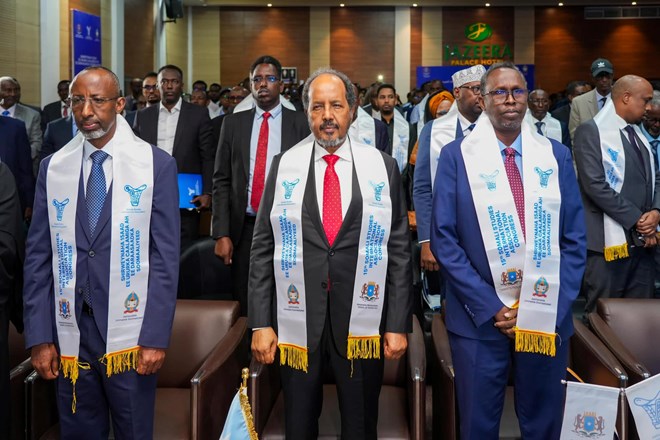
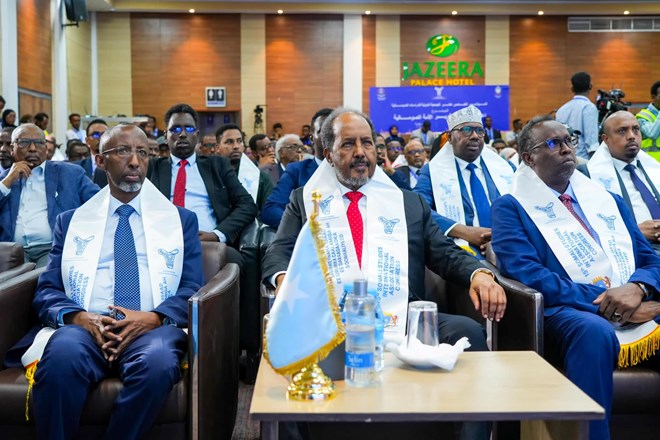
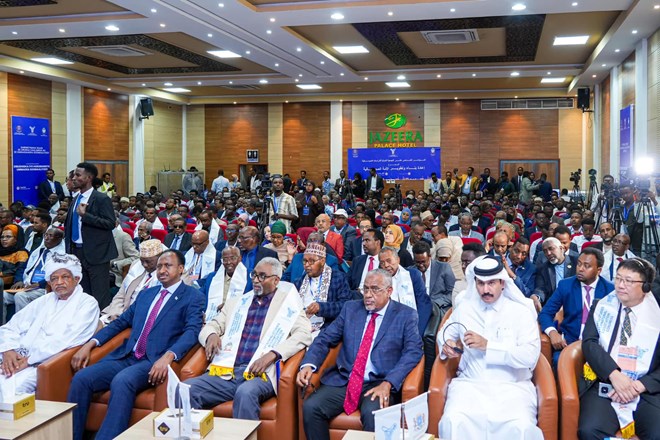
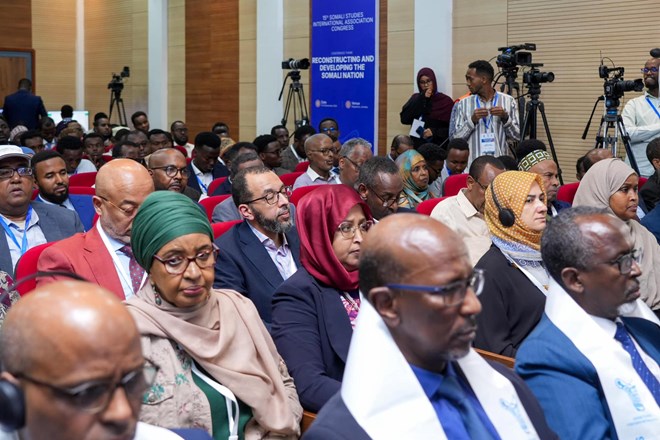
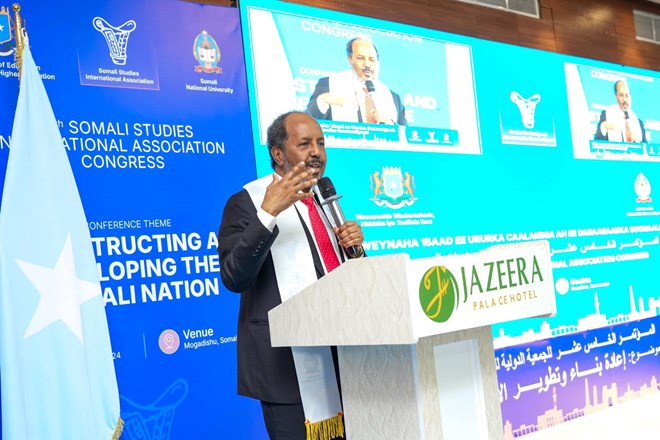
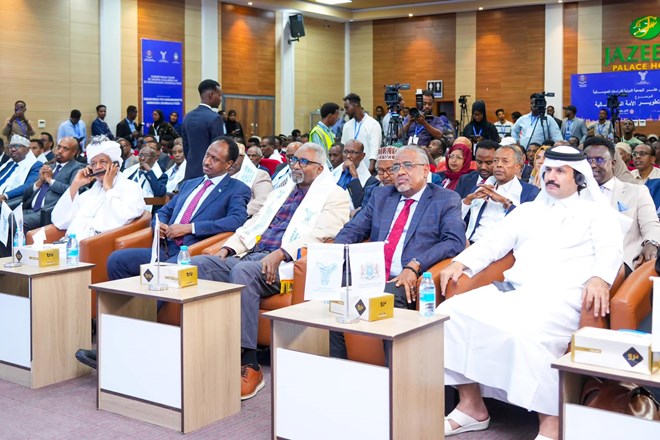
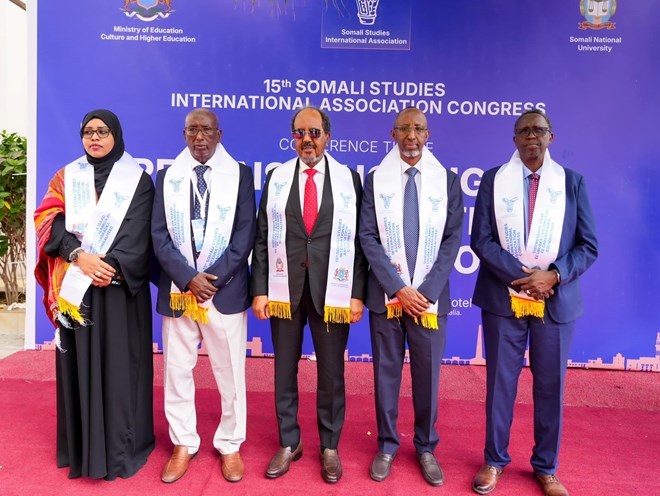
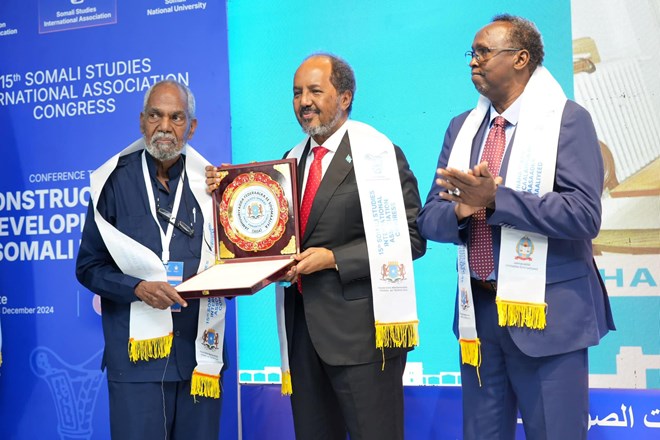

Axad, December, 15, 2024 (HOL) – Madaxweynaha Soomaaliya Xasan Sheekh Maxamuud ayaa maanta magaalada Muqdisho ka Daah furay, Shirweynaha 15-aad ee Ururka Caalamiga ah ee Daraasaadka Soomaaliyeed, waana 35 sano kadib oo Muqdisho lagu qabanayo shirkaan.
Madaxweyne Xasan Sheekh ayaa dul istaagay ahmiyadda ay dowlad-dhiska iyo sookabashada Qaranka Soomaaliyeed ay u leedahay, in hab cilmiyeysan loo darso caqabadaha ku gudban horumarka dowladnimo, dhaqaale iyo aqoon ee Ummadda Soomaaliyeed.
Madaxweynaha ayaa sidoo kale tilmaamay in ay dowladda ka go’an tahay, garab istaagga Aqoonyahannada iyo cilmi baarayaasha Soomaaliyeed, si xal waara loogu helo mushkiladaha hortaagan isku filnaanshaha dadka Soomaaliyeed.
“Halganka dowlad-dhiska ee aan kusoo jirnay tan iyo burburkii, mar waliba waxaan dareemeynay maqnaanshaha kaalinta mufakiriinta Soomaaliyeed ee si dhab ah u darsilahaa mushkiladaha na haysta, nasiib wanaag Shirkan, waxa uu kusoo aaday waqtigii ugu mudnaa oo ay tahay in aan uga faa’iideysanno si dhaqsi leh” Ayuu yiri Madaxweyne Xasan.
Shirweynaha meertada 15-aad ee Ururka caalamiga ah ee Daraasaadka Soomaaliyeed, oo markiisii ugu horreysay la qabtay sanadkii 1979-kii ayaa sanadkan waxaa ka qayb galaya, in ka badan 400 oo ergo ah, kuwaasi oo isugu jira aqoonyahanno Soomaaliyeed, cilmi baarayaal caalami ah iyo qaar kamid ah mas’uuliyiinta Jaamacadaha geeska Afrika, waxaana gabagabada Shirkan laga soo saaridoona, Daraasado ku saabsan horumarinta Mujtamaca Soomaaliyeed.
The UAE Casts Curious Shadow in Africa
The UAE Casts Curious Shadow in Africa
Source: Wrote by The Geneva-based The Responsible Security Association published on 4 December 2024 a commentary titled “Casting a Shadow: The UAE in Africa” by Raphael Parens, Foreign Policy Research Institute.
The UAE is heavily involved in civil wars in Libya and Sudan. Illicit gold flows through Abu Dhabi fund armed groups, mercenaries, and juntas in West Africa. The UAE may even be considering establishing its own “foreign legions,” drawing from the examples of the Russian Wagner Group and the French Foreign Legion to build the country’s brand of aggressive foreign involvement.
US ‘welcomes’ Ethiopia-Somalia deal on sea access
US ‘welcomes’ Ethiopia-Somalia deal on sea access

Source: AFP, Saturday December 14, 2024
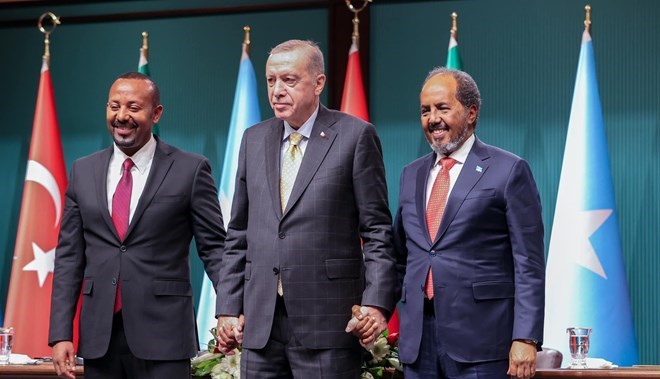
WASHINGTON: The United States on Thursday said it welcomed the accord reached by Somalia and Ethiopia to end regional tensions, sparked by Addis Ababa’s push for maritime access.
The two countries had been at loggerheads since landlocked Ethiopia struck a deal in January with Somalia’s breakaway region of Somaliland to lease a stretch of coastline for a port and military base.But on Wednesday, regional power Turkiye, which had brokered talks between Somalia and Ethiopia, announced the two sides had reached a deal that would ensure “reliable, safe and sustainable access” to the sea for Ethiopia, “under the sovereign authority of the Federal Republic of Somalia.”
“The United States welcomes the December 11 Declaration between the Federal Republic of Somalia and the Federal Democratic Republic of Ethiopia reaffirming each country’s sovereignty, unity, independence, and territorial integrity,” top US diplomat Antony Blinken said in a statement.
Blinken added the United States was looking forward to the “technical negotiations” that would spell out Ethiopia’s sea access “while respecting Somalia’s territorial integrity.”
After Ethiopia had announced its original deal with Somaliland — which unilaterally declared independence from Somalia in 1991 — authorities in the region said Ethiopia would give their government formal recognition.
The pledge was never confirmed by Addis Ababa.
Somalia branded the deal a violation of its sovereignty, setting international alarm bells ringing over the risk of renewed conflict in the volatile region.
Blinken also thanked Turkiye for “facilitating” the new agreement.
The statement came as he was in talks with Turkish President Recep Tayyip Erdogan in Ankara on the situation in Syria.
“We encourage Ethiopia and Somalia to intensify their cooperation on mutual security interests, particularly the fight against Al-Shabab,” Blinken said
Somali government clarifies AUSSOM troop selection not part of Ankara talks
Somali government clarifies AUSSOM troop selection not part of Ankara talks

Source: hIIRAAN ONLINE, Saturday December 14, 2024

Mogadishu (HOL) — Somali government confirmed Thursday that the AUSSOM troop deployment plan was not part of the Ankara talks that resolved a year-long diplomatic dispute between Somalia and Ethiopia.
Speaking during a Twitter space session, Somalia’s Minister of Foreign Affairs, Ahmed Moallim Fiqi, emphasized that the federal government retains full authority over selecting countries contributing to the African Union Somalia Mission (AUSSOM), which will replace the ATMIS mission in January 2024.
“The Ankara Declaration reaffirmed Somalia’s independence, unity, and territorial integrity,” said Fiqi. “While regional cooperation is vital, Somalia alone will decide the composition of AUSSOM troops.”
Ethiopia has expressed interest in remaining part of Somalia’s peacekeeping operations and joining the upcoming AUSSOM mission. However, Somalia previously announced Ethiopia’s exclusion, mandating the withdrawal of its forces.
The clarification follows the Turkish-brokered agreement between Somalia and Ethiopia, signed on December 11, 2024, after extensive negotiations in Ankara. The deal aimed to resolve tensions, including Ethiopia’s controversial 2024 memorandum of understanding (MOU) with Somaliland. The MOU proposed leasing coastal land for a naval base in exchange for recognizing Somaliland’s independence, a move Somalia condemned as an attack on its sovereignty.
The agreement guarantees Ethiopia’s access to the sea while respecting Somalia’s territorial integrity, marking a new chapter in bilateral relations.
Fiqi reiterated the government’s commitment to safeguarding Somalia’s sovereignty and maintaining control over critical decisions, including peacekeeping partnerships.
EU welcomes Ethiopia-Somalia agreement, acknowledges Türkiye’s ‘important’ role
EU welcomes Ethiopia-Somalia agreement, acknowledges Türkiye’s ‘important’ role

Source: Anadolu Agency, Selen Valente Rasquinho
Saturday December 14, 2024

The EU on Thursday expressed satisfaction with the resolution of the dispute between Ethiopia and Somalia, recognizing Türkiye’s “important” role in the process.
EU Spokesman for Foreign Affairs Anouar El Anouni, responding to Anadolu’s question during a daily press briefing, commented on the Ankara Declaration signed on Wednesday between Ethiopia and Somalia, with Türkiye acting as the facilitator.
“The European Union welcomes the declaration agreed in Ankara on the 11th of December,” El Anouni said.
He noted that the resolution highlights the importance of mutual respect and dialogue in reducing tensions across Africa. He reiterated the EU’s support for the “unity, sovereignty and territorial integrity” of Somalia and Ethiopia, “pursuant to principles entrenched in international law.”
Acknowledging Türkiye’s key facilitation role, El Anouni said: “We recognize the important role taken by the Republic of Türkiye in achieving this agreement.”
He also affirmed the EU’s readiness to support further efforts and mediation initiatives.
Ankara Declaration
Turkish President Recep Tayyip Erdogan hosted his Somalian counterpart Hassan Sheikh Mohamud and Ethiopian Prime Minister Abiy Ahmed in Ankara on Wednesday before the three leaders announced the Ankara Declaration.
“We have taken the first step toward a new beginning based on peace, cooperation between Somalia, Ethiopia,” Erdogan said at a joint news conference in the Turkish capital.
The leaders of Somalia and Ethiopia “reaffirmed their respect and commitment to one another’s sovereignty, unity, independence and territorial integrity, as well as the principles enshrined in international law, the Charter of the United Nations and the Constitutive Act of the African Union,” Türkiye’s Communications Directorate said.
The two East African countries have been at odds since Ethiopia struck a deal with Somalia’s breakaway region of Somaliland on Jan. 1 to use its Red Sea port of Berbera. Türkiye has been working to end tensions between the two countries.
Somaliland to reassess Ethiopia MoU following Ankara agreement
Somaliland to reassess Ethiopia MoU following Ankara agreement

Source: Hiiraan Online, Saturday December 14, 2024

Hargeisa (HOL) — Somaliland’s new government announced plans to reevaluate its memorandum of understanding (MoU) with Ethiopia following the recent Somalia-Ethiopia agreement mediated by Turkey, which resolved a year-long diplomatic dispute over the MoU.
Mohamed Farah Abdi, spokesperson for the ruling Waddani Party, told BBC Somali on Friday that the Turkish-brokered Ankara agreement, signed on December 11, 2024, does not directly affect Somaliland.
“The agreement in Ankara has nothing to do with us; it was signed between two neighboring countries. We are Somaliland,” Abdi said.
The spokesperson revealed that Somaliland’s government has yet to review the contentious MoU, signed in 2024 and proposed leasing coastal land to Ethiopia for a naval base in exchange for recognizing Somaliland’s independence. Somalia strongly opposed the deal, calling it a violation of its sovereignty.
“The new government will study the MoU. If it aligns with Somaliland’s interests, it will proceed. If not, it will be shelved,” Abdi stated.
The newly elected government, led by President Abdirahman Mohamed Abdullahi Irro, has committed to reassessing all major agreements to ensure they serve Somaliland’s long-term interests.
The Somalia-Ethiopia agreement, facilitated by Turkish President Recep Tayyip Erdogan, reaffirmed both nations’ commitment to sovereignty, territorial integrity, and international law. Former Somaliland President Muse Bihi Abdi and Prime Minister Abiy Ahmed signed the MoU in Addis Ababa on January 1, 2024.
Somaliland President Irro unveils full cabinet after election victory
Somaliland President Irro unveils full cabinet after election victory

Source: Hiiraan Online, Saturday December 14, 2024

Hargeisa (HOL)— Somaliland President Abdirahman Mohamed Abdullahi Irro announced his Council of Ministers on Saturday, unveiling a 48-member cabinet shortly after his inauguration as the region’s sixth president.
The cabinet includes 28 ministers, 16 deputy ministers, and four state ministers.
Ministers:
1. Abdalla Mohamed Arab (Sandheere): Minister of Internal Security.
2. Hassan Ahmed Duale (Macallin): Minister of Local Government and Urban Development.
3. Yoonis Ahmed Yoonis Muxummad: Minister of Justice.
4. Abdillaahi Hassan Adan Awaale: Minister of Finance and Economic Development.
5. Abdirahman Dahir Adan Bakaal: Minister of Foreign Affairs and International Cooperation.
6. Dr. Hussein Bashir Hirsi Wahan: Minister of Health Development.
7. Hussein Ahmed Aydiid Warsame: Minister of Public Works, Land, and Housing.
8. Khadar Hussein Abdi Looge Minister of the Presidency.
9. Ali Jama Farah (Buureed): Minister of Fisheries and Marine Resources.
10. Mohamed Yusuf Ali Ahmed (Ilkacase): Minister of Defense and Security.
11. Eng. Ahmed Jama Barre Rooble: Minister of Energy and Minerals.
12. Ms. Kaltuun Sh. Hassan Abdi Madar: Minister of National Planning and Development.
13. Osman Ibrahim Nuur (Af-gaab): Minister of Transport and Road Development.
14. Prof. Ismail Yusuf Duale Guuleed: Minister of Education, Training, and Science.
15. Abubakar Abdirahman Good Wacays: Minister of Water.
16. Ms. Milgo Mohamed Cilmi (Sambalooshe): Minister of Labor, Social Affairs, and Family.
17. Mahmoud Cige Yusuf: Minister of Agricultural Development.
18. Mr. Fu’aad Ahmed Nuux Nuur: Minister of Aviation, Air, and Airport Development.
19. Ahmed Yasin Sh. Ali Ayaanle: Minister of Information, Awareness, and Culture.
20. Abdillaahi Osman Jama (Geel-jire): Minister of Environment and Climate Change.
21. Ahmed Aw-daahir Haji Hassan: Minister of Parliamentary Relations and Constitutional Affairs.
22. Jamaal Mohamed Jama Ahmed: Minister of Communications and Technology.
23. Saleebaan Duale Haji Jama: Minister of Resettlement and Humanitarian Affairs.
24. Ahmed Mohamed Farah Coofle: Minister of Sports and Youth.
25. Omar Shucayb Mohamed Cabsiiye: Minister of Rural Development and Welfare.
26. Sheikh Abdillaahi Dahir Jamaac (Baashe): Minister of Religious Affairs and Endowments.
27. Abdirahman Hassan Nur Furre: Minister of Commerce and Tourism.
28. Said Mohamed Burale Carraale: Minister of Investment and Industrial Development.
State Ministers:
29. Mohamed Yusuf Ibrahim Faacuul: State Minister for Education.
30. Abdirashid Mohamed Ahmed (Magaalo): State Minister for Internal Security.
31. Ismail Mawliid Abdillaahi Hassan: State Minister for Finance and Economic Development.
Deputy Ministers:
32. Mukhtaar Haaji Muxummad: Deputy Minister of Agriculture.
33. Ahmed Omar Haaji Abdillaahi (Xamarji): Deputy Minister of Local Government.
34. Muse Askar Guled Jamac: Deputy Minister of Information.
35. Ms. Samsam Mohamed Salah Yacniile: Deputy Minister of Health Development.
36. Jamaal Jamac Xamud Dhunkaal: Deputy Minister of Religious Affairs.
37. Ali Ahmed Abdi Cantar: Deputy Minister of Livestock and Rural Development.
38. Yusuf Nuux Yusuf (Tadhase): Deputy Minister of Youth and Sports.
39. Mohamed Muse Haaji Abdi (Galaydh): Deputy Minister of Labor, Social Affairs, and Family.
40. Sharmaake Abdi Muse Mohamed: Deputy Minister of Fisheries and Marine Resources.
41. Abdirahman Shide Bile Dharaar: Deputy Minister of Resettlement and Humanitarian Affairs.
42. Yusuf Kayse Abdillaahi Adan: Deputy Minister of Aviation and Airports.
43. Dr. Mohamed Aw Dahir Ibrahim: Deputy Minister of Environment and Climate Change.
44. Eng. Mohamed Elmi Hussein (Huuno): Deputy Minister of Investment and Industry.
45. Jawhar Siciid Warsame: Deputy Minister of Commerce and Tourism.
46. Eng. Maliki Abdi Hassan Hirsi: Deputy Minister of Communications and Technology.
47. Mohamed Muse Bucul Bookh: Deputy Minister of Parliamentary Relations and Constitutional Affairs.
48. Mohamed Abdimaalik Ahmed: Deputy Minister of Transport and Roads.
The newly elected government, led by President Abdirahman Mohamed Abdullahi Irro, pledged to soon appoint the remaining deputy and state ministers, though no reason was provided for the delay.
Abdirahman Mohamed Abdullahi, the region’s former opposition leader elected in November 2024, became the sixth president of Somaliland, taking over from Muse Bihi Abdi during an inauguration ceremony in Hargeisa.
Somaliland declared independence from Somalia over 30 years ago but remains unrecognized by the African Union, the United Nations, or any country as an independent state. Somalia continues to regard Somaliland as part of its territory.
Ethiopia, Somalia resolve year-long feud in Turkey-brokered agreement
Source: Hiiraan Online, Ethiopia, Somalia resolve year-long feud in Turkey-brokered agreement

Thursday December 12, 2024
Turkish President Tayyip Erdogan poses with Somali President Hassan Sheikh Mohamud and Ethiopian Prime Minister Abiy Ahmed following a press conference in Ankara, Turkey, December 11, 2024. Murat Kula/Presidential Press Office/Handout via REUTERS
ANKARA, Turkey (HOL) — Ethiopia and Somalia have agreed to resolve a year-long diplomatic feud in a historic agreement brokered by Turkish President Recep Tayyip Erdogan on December 11, 2024. The deal, reached after marathon negotiations in Ankara, seeks to ensure Ethiopia’s access to the sea while respecting Somalia’s territorial integrity.
“This historic agreement is a first step towards peace and cooperation,” Erdogan announced at a joint press conference with Somali President Hassan Sheikh Mohamud and Ethiopian Prime Minister Abiy Ahmed. The leaders agreed to initiate technical talks by February 2025, aiming to conclude within four months, with Turkey providing support if needed.
“This agreement is a turning point for Somalia and Ethiopia, moving us toward a future of peace and mutual benefit,” Erdogan said at a press conference following the talks.
According to a government source, the meeting was reportedly requested by Ethiopian Prime Minister Abiy Ahmed.
Abiy emphasized Ethiopia’s peaceful intentions, calling the agreement a “positive undertaking” that would bring economic benefits to both nations. “Our aspiration for secure and reliable access to the sea is a venture that benefits not only Ethiopia but the entire Horn of Africa region,” Abiy stated. President Mohamud echoed these sentiments, underscoring Somalia’s readiness to work collaboratively, adding, “The Horn of Africa needs our cooperation more than ever.”
The agreement comes after a year of heightened tensions following Ethiopia’s controversial January memorandum of understanding (MOU) with Somaliland. The MOU proposed leasing coastal land to Ethiopia for a naval base in exchange for recognizing Somaliland’s independence, which Somalia condemned as a violation of its sovereignty.
The dispute escalated with diplomatic expulsions and culminated with Somalia’s pledge to exclude Ethiopian troops from the upcoming African Union Support and Stabilization Mission in Somalia (AUSSOM) unless the MOU was annulled. According to a source close to the talks, Somalia’s firm stance altered Ethiopia’s approach.
“By threatening to exclude Ethiopian forces from AUSSOM unless the MOU was annulled, Somalia effectively forced Ethiopia into a diplomatic pivot.”
The feud also amplified regional instability, drawing in neighboring Egypt, which bolstered ties with Somalia as part of its broader rivalry with Ethiopia over the Grand Ethiopian Renaissance Dam (GERD). In August 2024, Egypt signed a security agreement with Somalia, providing military aid to counter Ethiopian influence. However, its relationship with Somalia is intricately tied to its broader rivalry with Ethiopia over the Grand Ethiopian Renaissance Dam (GERD). With Ethiopia and Somalia now seeking reconciliation, Egypt’s future role in AUSSOM may face recalibration.
Meanwhile, Al-Shabaab capitalized on the uncertainty, using the crisis as a recruitment tool. The group has also intensified attacks across Somalia and raised concerns about the effectiveness of counterterrorism efforts in the region.
Abiy appeared to disavow previous comments suggesting that his nation would gain access to the sea ‘by force’ if necessary and emphasized the peaceful intent of his country’s maritime aspirations, stating, “This venture will benefit all our neighbours and foster regional cooperation.” Somali President Mohamud echoed these sentiments, calling the agreement a “halt to differences” and pledging to collaborate for mutual prosperity.
Ethiopia’s pursuit of maritime access is driven by economic and political pressures, including reliance on landlocked trade routes and internal instability caused by Oromo and Amhara militant conflicts. The MOU with Somaliland, though intended to secure sea access, exacerbated Ethiopia’s diplomatic isolation and drew criticism from Somalia, Egypt, as well as other regional and international actors.
Turkey, which has strengthened ties with both nations through economic and defence agreements, played a pivotal role in mediating the talks after two earlier rounds failed to yield progress.
Turkey’s mediation aligns with its geopolitical interests, including recent agreements with Somalia on maritime defence and hydrocarbon exploration.
The Ankara agreement marks a major milestone in reshaping the geopolitics of the Horn of Africa. While the deal offers a pathway toward stability and cooperation, lingering questions remain about its implementation and long-term implications.
Somali president leads talks in Turkey over tensions with Ethiopia
Somali president leads talks in Turkey over tensions with Ethiopia

Source: Hiiraan Online, Wednesday December 11, 2024

Somali President Hassan Sheikh Mohamud arrives in Ankara, Turkey, leading a delegation for critical talks with Ethiopian officials. The discussions, mediated by Turkish President Recep Tayyip Erdoğan, aim to address escalating tensions over Ethiopia’s agreement with Somaliland. Ankara (HOL) — Somali President Hassan Sheikh Mohamud arrived in Ankara on Monday night, leading a delegation to join talks mediated by Turkish President Recep Tayyip Erdoğan. Now, in their third round, the discussions aim to resolve escalating tensions between Somalia and Ethiopia over a contentious agreement with Somaliland.
The Somali government has drawn a clear line: no direct engagement with Ethiopian Prime Minister Abiy Ahmed unless Addis Ababa retracts its deal with Somaliland and acknowledges Somalia’s sovereignty and territorial unity.
The talks come at a critical juncture for Somalia, which views Ethiopia’s actions as an affront to its territorial integrity. President Mohamud’s delegation includes Defense Minister Abdulkadir Mohamed Nur, intelligence chief Abdullahi Mohamed Ali “Sanbalolshe”, former Deputy Prime Minister Mahdi Guled, National Security Advisor, Hussein Moalim, Foreign Minister Ahmed Moallim Fiqi. Their presence underscores Mogadishu’s determination to defend its national interests.
“Somalia remains steadfast in its commitment to sovereignty and unity,” a Somali government official stated. “Any negotiations must respect these principles.”
Guriga Haweenka Somaliyeed Muqdisho
Somali International Rehabilitation Centre (SIRC) www.sirclund.se . Waxay usoo jeedinaysaa Dawladda Federaalka Somalia in cabashada ururka haweenka Somaliyeed oo laxiriira Guriga Haweenka Somaliyeed ee Mugdisho in Dawladda Federaalka si deg deg ah wax uga qabato bacdamaa haweenka Somaliyeed yihiin lafdhabarka Somalia. Maamulka gurigood oo dawladdii Siyaad Barre udhistay haweenka Somaliyeed yaan lagu faragalin!!!
Abdillahi Jama

